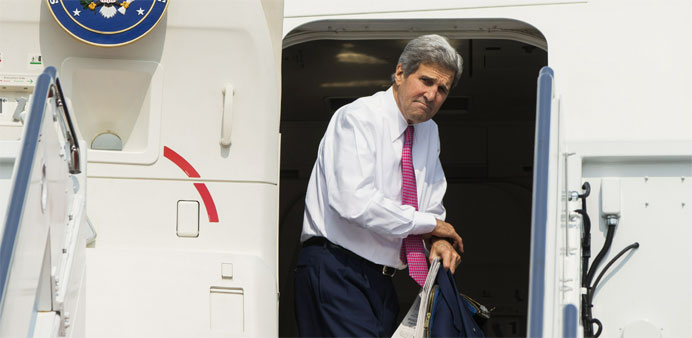AFP/New Delhi
US Secretary of State John Kerry flew into India on Wednesday for ice-breaking talks with new Prime Minister Narendra Modi, forecasting a transformation in Washington's troubled relations with New Delhi.
Kerry, who landed in Delhi on an overnight flight from Washington, is the highest-ranking member of the Obama administration to visit India since the Hindu nationalist Modi won a landslide election in May.
The top diplomat's trip is intended to pave the way for a visit by Modi to the US later this year, nearly a decade after he was denied a visa over deadly anti-Muslim riots in the state where he was chief minister.
For the past two decades, the world's two largest democracies have described themselves as natural allies, sharing similar concerns over China's rise and Islamic extremism.
But incidents including the US arrest of an Indian diplomat last year sent ties plunging to their lowest point in years, and analysts say Modi's previous treatment as a pariah still rankles.
And a new row is brewing over a customs deal, despite efforts to emphasise areas where the two sides can make common cause.
In a joint editorial with US Commerce Secretary Penny Pritzker in Wednesday's Economic Times, Kerry said Modi's strong mandate opened up possibilities for cooperation on issues from boosting trade to energy.
"The long-standing partnership between the US and India is on the cusp of an historic transformation," said the commentary in the Delhi-based daily.
"Working together, the world's oldest democracy and the world's largest democracy can forge a new era of shared prosperity and security for hundreds of millions of people in India, across Asia and the world."
The US officials will hold talks with Indian officials on Thursday and Kerry will meet Modi on Friday.
For some observers, Kerry's three-day trip is in itself a sign of India's importance. He has focused much of his tenure on crises in the Middle East, and returned just Sunday from a gruelling, unsuccessful mission to end the Gaza conflict.
"It is significant that the secretary is able to stick to making time for the Strategic Dialogue with India when there are literally parts of the world in flames," said Alyssa Ayres, a former State Department official.
- Lingering resentment -
Despite strong ties between their people, the Indian and US governments have frequently been at odds.
After tensions during the Cold War and US sanctions over India's 1998 nuclear tests, former president Bill Clinton began reconciliation efforts. His successor George W. Bush pushed through a landmark nuclear cooperation accord with India.
But some Indian commentators saw President Barack Obama as less interested in the relationship, even though he threw US support behind New Delhi's leading goal of winning a UN Security Council seat.
Relations took a sharp turn for the worse when US authorities in December arrested an Indian diplomat on allegations of mistreating her servant, leading New Delhi to retaliate against US personnel.
Modi has little reason for gratitude toward the United States. In 2005, Washington refused him a visa over allegations of turning a blind eye to anti-Muslim riots as leader of the state of Gujarat.
Allegations that Modi's Bharatiya Janata Party (BJP) had been the target of surveillance operations by the US national security agency while it was in opposition have added to the sense of grievance.
Indian foreign ministry spokesman Syed Akbaruddin said Wednesday that Kerry's visit was an opportunity "to explore transformative initiatives that can move the relationship to the next level" but he also said that concerns over cyber security would be raised.
"There is a considerable disquiet in India about the authorisation provided to American agencies in terms of contravening the privacy of individuals, entities and government of India," he told reporters.
- New row on WTO -
Modi does not appear eager to play up grudges and instead has shown pragmatism, meeting in his first months in office with the leaders of Pakistan and China despite his past hardline stances.
But in an unexpected rift ahead of Kerry's visit, Modi's government warned it may hold up a global customs pact that must be ratified by Thursday unless the World Trade Organization approves India's food subsidy programmes.
India buys grain at inflated prices to sell at subsidised prices. The programme is important for India's hundreds of millions of poor, but rich nations say it distorts trade.
On a visit to Mumbai, Pritzker said she was "very optimistic" about the new Modi government but criticised India's stance at negotiations.
"We are very disappointed that India has taken a step-back from its agreements that it made in December (last) at the WTO," Pritzker told the Press Trust of India news agency.

